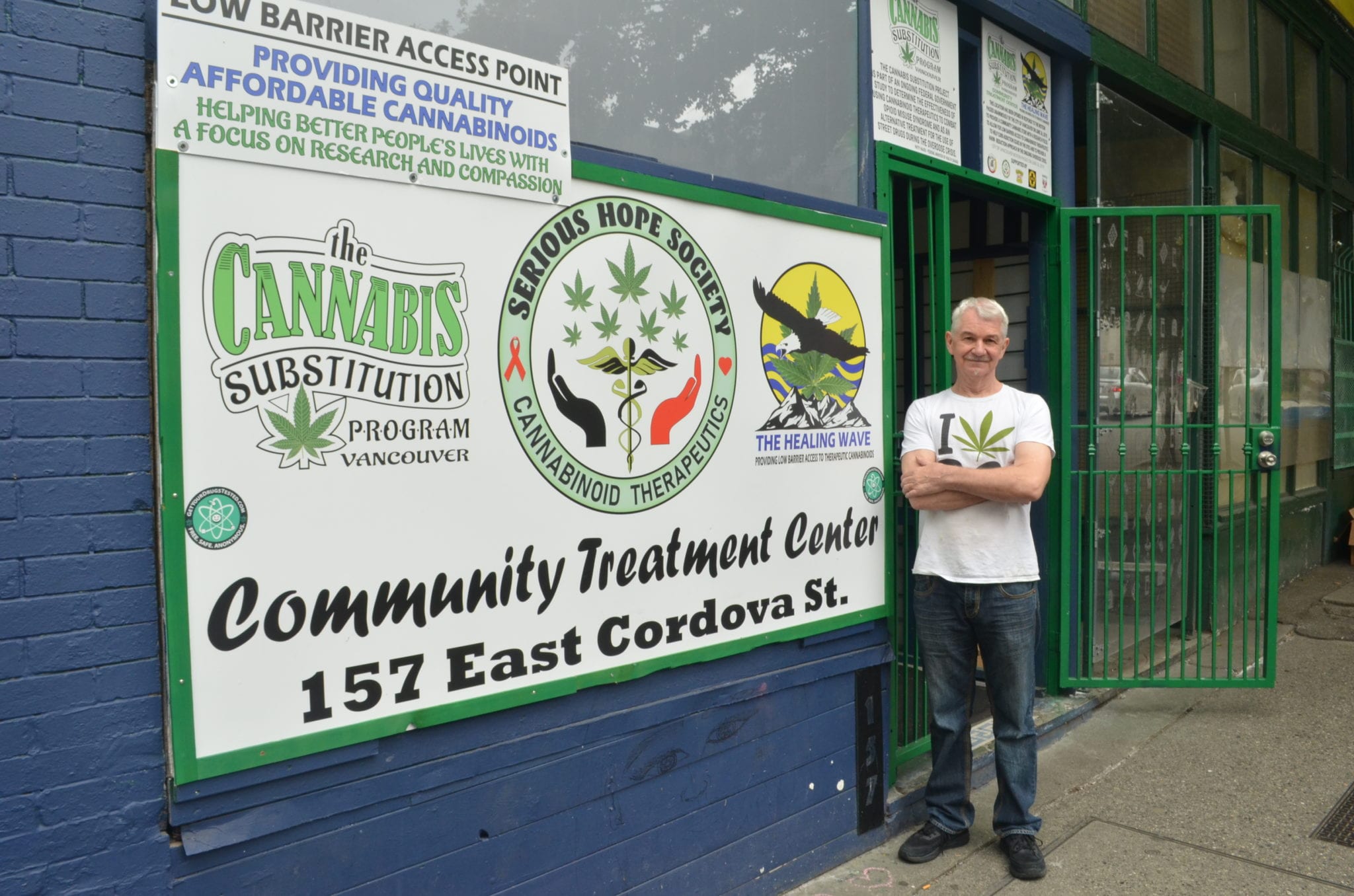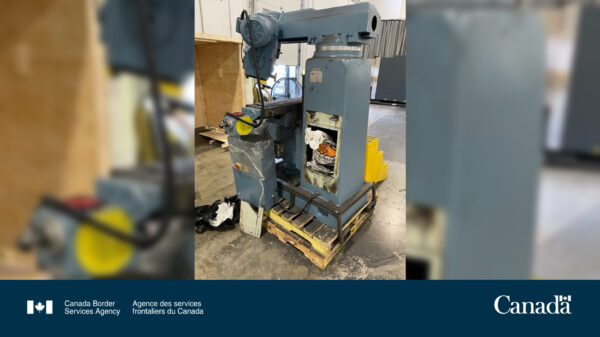Cannabis advocacy veteran Neil Magnuson greets people by name as they walk into the Vancouver Downtown Eastside’s newest weed store.
The small storefront is inviting, with free helpings of CBD orange chicken kept hot by a slow cooker in the corner. Staff roll and spark joints as they list off the product catalogue to customers.
The store’s prices are also staggering when compared to other cannabis retailers in the city. Joints sell for $1, pungent buds heaped in clear jars go for anywhere between $2.50 – $6 per gram. Caps with 50 milligrams of CBD sell for $2.50 each.
But the prices are still too high, says Magnuson with a shake of his head. They need to be even lower to entice people to buy weed instead of meth, which sells for similar prices on the street just outside the shop.
His new shop, The Healing Wave, is part of a grassroots harm reduction initiative called The Cannabis Substitution Project that helps people access low-cost cannabis as a substitute for other, more harmful substances. The initiative breaks laws at all three levels of government, but Magnuson says its life-saving potential justifies breaking the writ of law.
“I will not comply with any regulations that impede our ability to provide low-barrier access to people, or stop us from being able to help people in the ways that we are,” he says.
The storefront is divided into two parts: the Cannabis Substitution Project and The Healing Wave.
The CSP has around 200 members who are eligible for 420 milligrams of free cannabis every four days.
From previous advocacy work, Magnuson says he knew that giving people cannabis edibles could help people reduce their use of substances like heroin or meth. Recent studies from the BC Centre on Substance Use backs his claim, suggesting cannabis could be used in place of opioids, thereby reducing a person’s chances of being poisoned by street drugs cut with fentanyl.
Read more: Daily cannabis use could help battle overdose crisis: study

The retail space came brightly painted, which nicely matched the Cannabis Substitution Project’s logo, says founder Neil Magnuson. Photo by Michelle Gamage
Over 5,500 people have died from the overdose epidemic since it was declared a public health emergency in April 2016, according to numbers from the BC Coroners Office. During the Covid-19 pandemic overdose fatalities have seen a horrifying spike. In January and February overdose deaths were reported in the 70s, which has steadily risen to 175 fatalities in June — a record-breaking 130 per cent increase from the same time last year.
Magnuson wishes the program could serve more than 200 people. But the CSP runs off donations, and those only go so far, he says.
“It’s heartbreaking,” Magnuson said. “People are coming in and saying, ‘Hey, I want you to help me get off these drugs,’ but we don’t have the supplies.”
‘People over profit’
The Healing Wave is a low-barrier retail cannabis store that sells everything from bud to full-spectrum oil at a fraction of the cost of regulated retailers.
It’s designed to put people ahead of profit, Magnuson says. Sales help pay the rent and that’s about it, he adds.
To shop here you need to be member, but signup is free and doesn’t require ID. Out of the 618 people who have signed up since the store opened, Magnuson estimates 25 per cent didn’t give their real names. But that 25 per cent are likely some of the most vulnerable people who need access to low-barrier cannabis the most, he said.
Read more: Multiple barriers exist for people trying to access weed as a harm-reduction tool: study
Harm reduction has been one of the four pillars of Vancouver’s drug policy since the late 1990s, but using cannabis as a harm reduction tool has yet to be introduced to the city’s strategy, Coun. Rebecca Bligh told Mugglehead.
When it comes to drug policy, Bligh says the city defers to its local health authority, Vancouver Coastal Health. While Bligh says VCH’s chief medical health officer Dr. Patricia Daly seems open to the idea of using cannabis as a harm reduction tool, the health authority will need more time and research before it signs off on it.
As for how much time, Bligh estimates upwards of six months to a year. As for the city, it has to strike a balance between following its own bylaws and listening to people on the ground saying this saves lives, she says.
“Ultimately, the way forward is to endorse safe supply and see cannabis as part of harm reduction,” Bligh said.

Magnuson sells weed from “trusted, local sources.” Buying from licensed producers is like getting a can of tomato sauce when you wanted to buy local tomatoes, he says. Photo by Michelle Gamage
Currently The Healing Wave is unlicensed, and Magnuson says that’s unlikely to change anytime soon. The Cannabis Act creates barriers which would block vulnerable people from accessing weed, he said. To be licensed the store would also need to buy its product from licensed producers instead of its current unregulated sources — but to Magnuson that would be like buying cans of tomato sauce instead of farmers market heirloom tomatoes.
The CSP’s harm reduction initiative is supported by most politicians and the Vancouver Police Department, Magnuson says. If the store was raided by the provincial Community Safety Unit, which is tasked with upholding the Cannabis Act, they could be restocked and open again the next day. The store will also refuse to pay any fines, he adds.
Although operations have just begun, The Healing Wave and its landlord were served with cease and desist orders from the city last week.
“It would be unconscionable to stop what we’re doing here — criminal too,” Magnuson said.
Since being served the store has found a tentative solution to buy itself extra time. The store will apply for a federal exemption, which could take up to two years to process. Magnuson says The Healing Wave will likely not be approved for the exemption, but the city will be appeased while the store goes through the motions of trying to become licensed.
On Tuesday, Bligh said she was involved in talks to see how The Healing Wave and the CSP could keep their doors open, but that ultimately the store should be licensed.
One city, two public health crises
In May and June B.C. saw overdose deaths hit consecutive record highs, totalling 346 fatalities.
Following announcements of the death tolls, Premier John Horgan called on the federal government to decriminalize the possession of streets drugs last week. He’s not the fist person in government to do so. Before she was the face of calm during a viral pandemic, B.C.’s provincial health officer Dr. Bonnie Henry was an advocate for decriminalizing the possession of narcotics. She proposed decriminalization in April 2019, the same month 85 people died of overdose, according to numbers from the B.C. Coroners Service.
But Horgan never once mentioned harm reduction or changing the regulations around cannabis, which Magnuson says is a missed opportunity.
He’s watched the government drop everything and invest huge amounts of money to protect people from the Covid-19 pandemic, while at the same time seemingly ignoring the ongoing overdose crisis which has proven three times more deadly to British Columbians.
“Our overdose numbers eclipsed anything Covid-related, and it’s like we’ve become desensitized that this is just a reality. But these numbers are devastating,” Bligh said.
While balancing the two public health crises, Bligh says the city needs to keep harm reduction services open. That might just benefit 20 per cent of the people who access these services — but that could still offer support or save the lives of people with nowhere else so go, she said.
If the government really wanted to save lives they should stop regulating cannabis and start funding the CSP’s harm reduction initiative, according to Magnuson.
It’s an initiative he’s been building towards since 2016 when the city first declared the overdose epidemic a public health emergency.
For four years the CSP was based out of the Vancouver Area Network of Drug Users’s offices. Twice a week, volunteers would hand out care packages with free edibles and smokable flower to a lineup of around 250 people. But Magnuson wanted a permanent location where no one would have to line up, which he found mid-June and immediately opened shop.
Read more: DTES cannabis charity deemed essential during Covid-19 pandemic, not overdose crisis

Cannabis advocate Neil Magnuson and The Healing Wave staff. Photo by Michelle Gamage
Similar harm reduction initiatives are gaining traction around the world. Similar projects exist in Victoria, Halifax, and recently one started in California as well.
Transitioning from activism to running a small business is exhausting, but Magnuson shrugs when asked about his worries. He’s been working towards having a store like this for over a decade and has just figured out a way to keep the doors open a little longer — today is a good day, he says.
A man wanders into the store and heads straight to the CSP counter, no lineups involved. A couple come in to browse the day’s available bud and strike up a friendly chat with the staff. An older woman with a cane is handed a bowl of the CBD chicken with a slice of bread on the side.
It’s all part of the solution, Magnuson says with a smile.
Top image: Even the Cannabis Substitution Project’s logo goes against the Cannabis Act with its depiction of cannabis, but the CSP won’t change it’s sign, says founder Neil Magnuson. Photo by Michelle Gamage
michelle@mugglehead.com
@missmishelle















Chris Bud
October 5, 2020 at 2:30 pm
is the address a secret? talk about burying the lede… sheesh.. ive tried to find the area zip code for an hour and its not coming up anywhere.., no healing wave page on fb… nada,… what’s up peeps! Get more folks in if they have an addy. just sayin
Michelle Gamage
October 5, 2020 at 2:57 pm
Hi Chris,
No secrets: the Healing Wave’s address is 157 Cordova Street in Vancouver, Canada.
Cheers, Michelle
Teresa Thom
October 8, 2020 at 6:01 pm
Chris is right unless you live in the DTES you miss a lot of stuff that would help anyone in recovery.
I wish Neil would mention the address on his show on Pot TV with address .
Cheers
T